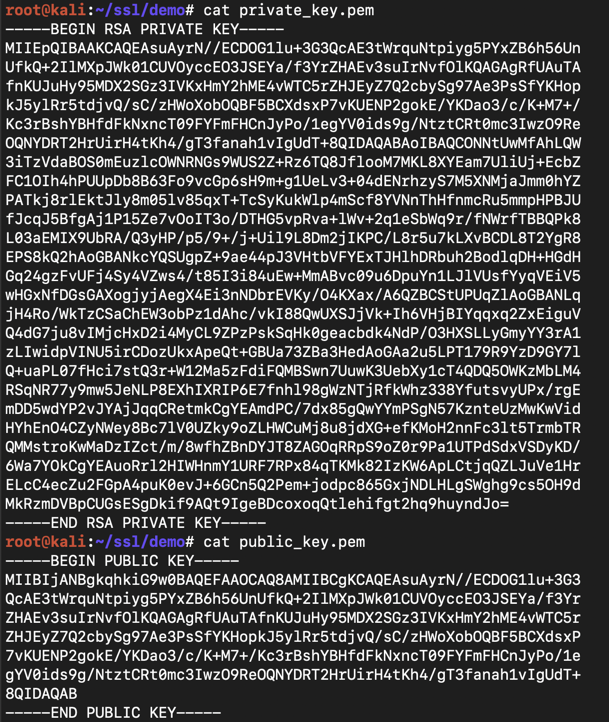Generate Rsa Pubic Key Openssl


To generate private (d,n) key using openssl you can use the following command: openssl genrsa -out private.pem 1024 To generate public (e,n) key from the private key using openssl you can use the following command: openssl rsa -in private.pem -out public.pem -pubout. Apr 18, 2016 Public key encryption: RSA; As we mentioned the server that implement SSL has pair of keys, public and private, which are used during the TLS handshake. /512-bit-encryption-key-generator.html. The most common public key encryption used in SSL is the RSA. In OpenSSL tools, the RSA is the default option when generating a public/private key. https://institutetree865.weebly.com/blog/array-ssl-vpn-mac-download. I'm learning about the OpenSSL ruby module. Shown below is a pry session where I generate a key using the RSA asymmetric public key algorithm. I also call the #private? Instance metho. Oct 01, 2019 # Generate Private Key and Certificate using RSA 256 encryption (4096-bit key) openssl req -x509 -newkey rsa:4096 -keyout privatekey.pem -out certificate.pem -days 365 # Alternatively, setting the '-newkey' parameter to 'rsa:2048' will generate a 2048-bit key. That generates a 2048-bit RSA key pair, encrypts them with a password you provide and writes them to a file. You need to next extract the public key file. You will use this, for instance, on your web server to encrypt content so that it can only be read with the private key. Export the RSA Public Key to a File. This is a command that is. Openssl rsa -in private.pem -outform PEM -pubout -out public.pem.
Openssl Generate Public Private Key
If you're using openssl_pkey_new() in conjunction with openssl_csr_new() and want to change the CSR digest algorithm as well as specify a custom key size, the configuration override should be defined once and sent to both functions:
<?php
$config = array(
'digest_alg' => 'sha1',
'private_key_bits' => 2048,
'private_key_type' => OPENSSL_KEYTYPE_RSA,
);
$privkey = openssl_pkey_new($config);
$csr = openssl_csr_new($dn, $privkey, $config);
?>
Although openssl_pkey_new() will accept the 'digest_alg' argument it won't use it, and setting the value has no effect unless you also set this value for openssl_csr_new(). The reason for this is that the $config array is acting as a drop-in replacement for the values found in the openssl.cnf file, so it must contain all of the override values that you need even if the function they're being sent to won't use them.
Also, if you change the 'digest_alg' to something like 'sha256' and still get an MD5 signed CSR check your openssl.cnf file to see whether the digest algorithm you want to use is actually supported.